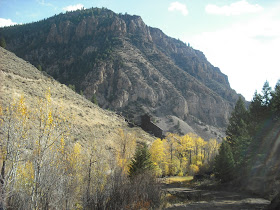In 2006, Bayhorse became a unit of Idaho’s State Park system and is the first OHV Recreation State Park in Idaho. It is an authentic blend of history and adventure. Bayhorse is nestled in a narrow, rocky canyon about three miles from where Bayhorse Creek enters the Salmon River, near Challis, Idaho. The terrain surrounding the town is rugged with steep slopes, deep canyons and wonderful views. Enjoy miles of new riding on trails within the park, and get extended trail access to hundreds of miles of trails on adjacent public lands. Ride the newly constructed Lombard Trail that starts from the Land of the Yankee Fork State Park Interpretive Center and continues over Blue Mountain to connect to the Bayhorse Area. Source: http://parksandrecreation.idaho.gov/recreation/motorbikesandatvs.aspx
While many, especially in the USFS wanted to see the town of Bayhorse, of which first buildings were built in 1853 torn down and burned to the ground, advocacy groups for the preservation of Idaho's first mining town prevailed.
Hundreds of Idaho mining towns, historical or not, have already been destroyed and any trace of their contributions to Idaho's history have been removed by USFS or BLM fire gods.
Without these little towns that came and went littering the landscape of Idaho, there would be no state.
In the case of Cinnabar and Stibnite, Idaho, two towns nestled against a wilderness backdrop located in the Payette National Forest, there indeed may not have been a United States of America in the years following WWII. Up to 95% of strategic minerals such as antimony and tungsten was supplied by these two towns. A significant amount of minerals essential for high explosives known as mercury fulminate came from the town of Cinnabar.
As was originally planned for Bayhorse, several USFS officials would love to see Stibnite and Cinnabar plowed into oblivion. In fact, dozens to hundreds of historic structures, on private land or not, have already been judged and consumed by the hellfire unleashed by almighty USFS fire gods.
As was originally planned for Bayhorse, several USFS officials would love to see Stibnite and Cinnabar plowed into oblivion. In fact, dozens to hundreds of historic structures, on private land or not, have already been judged and consumed by the hellfire unleashed by almighty USFS fire gods.
The battle for Stibnite is almost lost with few remaining structures. Cinnabar is very much intact and a favorite spot for outdoor enthusiasts thirsting for a firsthand glimpse of what it was like to fight for survival against the rugged Idaho wilderness. Visiting this town offers a window into Idaho's contributions to both world wars, providing minerals for explosives, alloys and munitions, crucial to defeating foreign threats.
It is only right that Cinnabar and the remnants of Stibnite be preserved for future generations to see. Not only is it the right thing to do, it is also federal law. The Antiquities Act, National Historical Preservation Act, to name a few.
It would be fitting to turn Cinnabar into a state park similar to Bayhorse, and to preserve the legacy of the pioneers who came to the wilderness and carved out the places we call home.


No comments:
Post a Comment